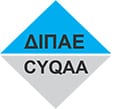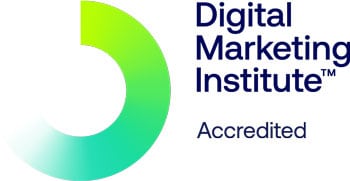
Konstantinos Kaminakis
Associated Academic Staff
Assistant Professor of Marketing and Communication
Athens University of Economics and Business


The Master (MSc) in Digital Marketing is accredited by the The Cyprus Agency of Quality Assurance and Accreditation in Higher Education (CYQAA) and by the Digital Institute of Marketing (DMI)
The MSc in Digital Marketing aims to promote students’ professionalism in a world where organisations and businesses face complex problems when at the same time it aims to promote students’ critical and cutting edge thinking in modern challenges and research trends of digital marketing. The field of digital marketing is rapidly evolving along with market’s need of professionals equipped with a contemporary knowledge management tool-kit. To this extent, the Master in Digital Marketing aims to equip students with tools and techniques of critical analysis and thinking to a high degree of professional standards. Furthermore, the MSc in Digital Marketing aims to advance students’ research skills towards applying them in real-life situations.
More specifically, the MSc in Digital Marketing aims, by combining both theoretical knowledge and practical approaches, to:
Neapolis University Pafos announces the professional certification of the new MSc in Digital Marketing by the internationally renowned digital marketing certification body, the Digital Marketing Institute (DMI).
Graduates of the programme acquire the status of a Digital Marketing Associate, immediately after graduating and with no further cost and certification exams and they are registered for life as members of the list of DMI Certified Professionals, which currently numbers 55,000 industry professionals worldwide. Furthermore, both the students and tutors will have access to DMI’s electronic library with the ability to utilise case studies, simulation exercises, e-books and manuals.
The MSc in Digital Marketing offers in-depth and comprehensive access to the structural foundations of digital marketing, including strategy and planning, search engine optimisation, social media, digital advertising and content, website optimisation and analytics.
The certification from the Digital Marketing Institute offers the possibility of continuous new knowledge to students through the updating of available educational material by world-renowned experts in the field of Digital Marketing. Digital Marketing Certified Professionals will gain the confidence needed to create and steer a revenue-generating digital marketing strategy for companies of any size.
Our Digital Marketing MSc will provide you with specialised knowledge and skills through a rigorous academic and applied study of marketing in the digital landscape. You’ll discover how businesses use digital marketing and online metrics. Moreover, you will explore a range of topics such as digital strategy, e-consumer analysis, social media, big data analytics and digital entrepreneurship. Through this programme you will learn the techniques shaping the industry today, the strategic & tactical uses of digital marketing and understand how to be competitive in contemporary business.
After the completion of the Master in Digital Marketing, graduates are expected to be able to:
The Master’s teaching methodology involves a combination of lectures, tutorials, seminars, examinations, projects, presentations, assignments, case-study applications and independent research. In addition, it is designed to provide an academic experience going beyond that of the traditional classroom, in which the flow of information is primarily from the instructor to the student. The intention of the Master in Digital Marketing is that each participant will contribute to the education of the entire class though active participation in the learning procedure. The MSc in Digital Marketing follows a student-centered strategy based on a mix of various active learning techniques aiming to embed real-life scenarios to the Master’s core of activities and at the same time, through a research-oriented strategy, the MSc in Digital Marketing aims to equip students with applied research skills. It is essential students enrolled MSc in Digital Marketing to learn through active teaching and learning mix of techniques combining real life and research aspects towards creating professional with high degree of professional standards. To this extent, our student-centered approach is implemented through interactive tasks and formative assessments (not graded) which are scheduled and mapped at each syllabus. Moreover, the learning journey is enriched with simulation games by well-known simulation packages and the Neapolis Experiential Studying Tasks-NEST, which offers the opportunity of assignments designed in collaboration with companies based on their real-life needs.
Each course is evaluated by mid-term assignment(s) during the semester and examining at the end of the semester. In the event that a student has not attended the examination or failed to attend a fall or spring semester, he/she is entitled to take a re-test at the end of the academic year.
30% or 40% of the students’ final grade in each course corresponds to their performance in the midterm assessment and other interactive graded activities, whereas 60% or 70% – respectively to midterm assessment – corresponds to their performance in the final exams. In order to secure a passing grade in a course, students need to secure a passing grade (i.e. 50% or higher) in all assessment components.
The dissertation cannot be shorter than 13,000 words and longer than 15,000 words, including the bibliography and the abstract. After submission, the main supervisor prepares a written and reasoned report with his/her consent for public support. The defense of the dissertation is made publicly or via an electronic videoconference before a three-member committee.
| Code | Course title | Course type | ECTS |
|---|---|---|---|
| DDM515 | Digital Marketing | Compulsory | 7.5 |
| DMBA561 | Marketing Management and BU Communications | Compulsory | 7.5 |
| DDM507 | Digital Marketing Analytics | Compulsory | 7.5 |
| DDM504 | e-Consumer Behavior | Compulsory | 7.5 |
| Code | Course title | Course type | ECTS |
|---|---|---|---|
| DDM505 | Digital Communication and Social Media Strategies | Compulsory | 7.5 |
| DDM508 | Big Data Analysis for Marketing | Compulsory | 7.5 |
| DMBA500 | Research Methods and Data Analysis | Compulsory | 7.5 |
| DDM510 | E-commerce | Compulsory | 7.5 |
| Code | Course title | Course type | ECTS |
|---|---|---|---|
| DDIS600 | Dissertation | Compulsory | 30 |
In order to be admitted into the Master in Digital Marketing, candidates must possess a Bachelor Degree or equivalent of Departments of Economic Sciences, Business Administration and Management, Marketing, Communication and Informatics. The general admission criteria are based on the type and quality of previous studies with grade 6.5/10 or 2:1 and the suitability of the candidate for the programme of study that has been applied for.
Students are expected to have a minimum prerequisite background in Marketing. In cases of applications with inadequate Marketing background, students will have to seat on a pass/fail basis on an undergraduate class such as Principles of Marketing (BUSN104).
The Master in Digital Marketing Coordinator will be actively involved in the review of applications and his approval will be required before admitting any student into the programme.
A student who applies for the MSc in Digital Marketing should submit the following documents:
The University reserves its right to define the electives offered on an academic year basis.
The programme structure may change without prior notice, as a result of quality assurance procedures or/and programme recertification.
Register your interest and one of our admissions consultants will contact you with guidance and additional information.